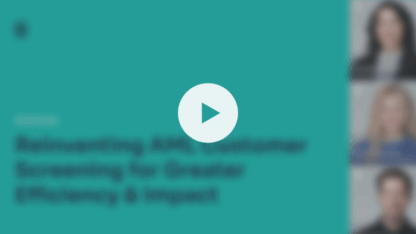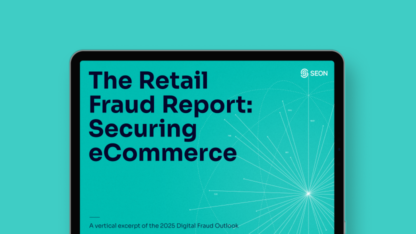A meteoric rise of fintech, accelerated digitalization of the entire global economy, and customers shifting to eCommerce from traditional retail – 2021 in a nutshell.
Heading into the new year, will the same problems arise or are we expecting new challenges? We teamed up with a trio of fraud experts to predict what 2022 has in store for the industry.
This session offers insight into the new techniques we’ve seen fraudsters use to exploit the system, what we need to do to stay a few steps ahead and what else to keep in mind this year.
Let 2022 be the year we fight fraud together ?
Agenda
- The Growing Importance of Digital Identity
- How the Pandemic Changed the Nature of Fraud?
- The Next Generation of Money Mules
- Modern Solutions – Modern Problems: Buy Now Pay Later
Speakers
- Gavin Burton, Identity Consultant & Trainer, Bereku
- John Marsden, Sales Director, We Fight Fraud
- Kevin McDonald, Fraud & Corruption Expert, Consultant
Hosted by
- Gergo Varga, Product Evangelist, SEON
Key takeaways
Digital Identity – guaranteed safety or another avenue for fraud?
From a fraud perspective it needs to be a secure framework to enable people to access masses of services, we’ve seen this with many European countries already. The digital identity landscape is all about validating people through their mobile phones but as soon as you do that, there’s going to be a level of user error. Ultimately though, this is a good thing because enables you to run other checks such as biometrics but criminals understand this and the demand for lost or stolen genuine documents is naturally going to go higher. – Gavin Burton.
We are seeing more compromise of these digital identity systems, with tips and advice being found on the open net instead of just the dark web forums. You need to make sure that your technology is doing everything it says it is. Documents and biometrics aren’t panaceas, a silver bullet to answering the problem of fraud but mixing these can massively help validate. And yet, while all these bits of data that make a digital identity are great, the criminals will develop the same files, the same data, the same identities to bypass checks and even at times turn to the first party to commit fraud. Through this people can pocket the money from the initiator as well as enforce chargebacks and/or deny any accusations of money that’s gone through their account which is only going to continue to frustrate businesses. – John Marsden.
From a personal perspective, I helped dismantle a very organized identity fraud network involving Ghanian nationals that had German citizenship and were working in the UK. In short, the chief of staff facilitated the whole process by waving people through documentation checks enabling them to recruit, become referees for other people all through a simple process of having someone on the inside. – Kevin McDonald.
Pandemic has proven the importance of collaboration
Fraudsters nowadays don’t just work on one type of fraud, with just one pair hands, the is all in the past. We’ve found in the pandemic that those industries which work together and minimize silos made for the best defenses, as more people have sat at home prodding your security. The best way forward is centering as much information as possible to create a holistic approach to industry-based fraud issues. The best companies I’ve worked with, do this very effectively. – Kevin McDonald.
Intelligence is great to share. Having been from a police background where we shared with both public and private sectors, the benefit of sharing information to prevent is far more effective than allowing for the crime to happen then go chasing after it. People often see sharing information as the dark arts but it’s actually really simply work that can help many companies. – Gavin Burton
When I’ve got friends messaging me mid-pandemic asking how they get onto the dark web, you quickly learn that there’s going to be a rise in people being bored and inquisitive. People are looking for things to research, to look at and I honestly feel like people have turned to fraud that previously might not have been, as well as that western governments gave blatant opportunities with public funds. – John Marsden.
Impact on youth
Many of us would have seen social engineering schemes, especially with the Tinder Swindler on Netflix but also there’s been an explosion of TikToks where they essentially advertise money muling as a victimless crime. It’s almost become normalized in many ways. – Gergo Varga.
It really has reached high epidemic type levels now where people are sharing this data, telling their friends of the success stories and fraudsters are just getting better at saying crime is away from where the person is actually involved. The more reckless will get caught but there’s a lot of money in the black market about now and more calculated money laundering schemes are only going to come to fruition. With the current economic situation as well, financial hardship and moral decay always drive fraudulent activity. – John Marsden.
There’s been a lot of work educationally in the last year or two but I think this has mainly been pushed towards students and perhaps this has to be pushed to a wider audience. With more people taking to money muling with or without any true idea of what they’re doing, it shows a clear gap in education when it comes to fraud and the potential implications. – Gavin Burton.








